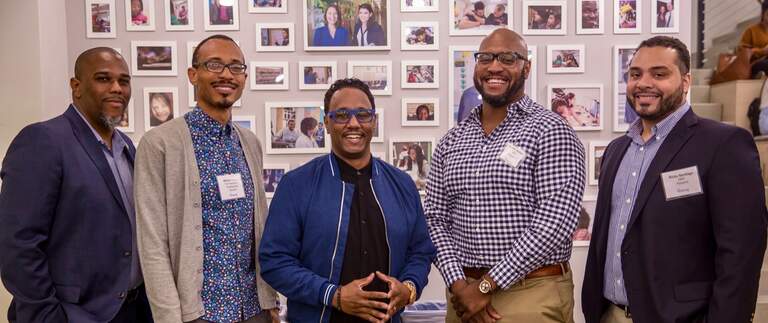iMentor NYC recently held the Mentoring Young Men of Color Panel as the first Mentor Community event of its 2019-20 program year. This event is part of our ongoing conversations about the issues, barriers, and challenges facing the students we serve.
Fifty-two percent of iMentor NYC students are male, and 98 percent are people of color. We are committed to helping our mentors be effective advocates of our students, and courageous conversations about race such as these help our mentoring pairs develop strong, open relationships.
The panelists included current mentors William Cooper, Austin Hinton and Sherman Reid, and Ricky Santiago, who mentors independently. Emmy Award-winning television host Mario Armstrong led the conversation.
“Now more than ever, we need people of color that we can look to as guideposts,” said Mario, who mentors young men both in person and virtually. “This is how these men on the panel have been successful. That’s why I love what iMentor is doing. You are breaking cycles and helping students see new opportunities.”
All four panelists benefited from having mentors in their own lives. And all four believe that being a strong advocate and champion to a young man of color in New York City starts with a deep sense of self-awareness and vulnerability about who you are. Only then, they said, can you make the kind of connections needed for a strong mentoring relationship. And only then can you listen, reflect, and guide in a way that brings all your life experiences—the failures and hardships along with the successes—to support a young person on their journey through high school and post-secondary success.
“The best thing you can give is honesty,” said William. “Pay attention to everything. You have to be there for them,” said Ricky. “Transparency and vulnerability are today’s currency,” added Mario.
“Nothing comes easy. People say ‘work hard and it will come to you.’ But that is not necessarily true,” said Austin, adding, “We [Ricky and I] work in news, and every morning there are terrifying things that happen with regards to race.”.
The regular news feed of acts of police brutality demonstrate how racial barriers are part of the structure of our society. Here are a few of the facts shared at the panel:
- Police brutality is the leading cause of death for young black men in America (Los Angeles Times, 2019).
- Black children are 18 times more likely to be tried as adults than are white children (Washington Post, 2018).
- While unemployment rates decreased among men aged 20 to 24 from 2017 to 2018, men of color still have higher rates of unemployment (JP Morgan Chase, 2018).
- Men of color are more likely to attend under-resourced schools with poor academic outcomes.
- Men of color are overrepresented in school discipline and juvenile justice systems.
- Men of color have the lowest school attendance rates.
All panelists emphasized the importance of active, empathetic listening, and of consistently being there for their mentee. “When I am going to the Bronx to meet with my mentee, I am carving out part of my day to be with you. That’s a powerful message,” said Will. “The life you live is not necessarily the one you want to push,” said Sherman.
So how is iMentor equipping mentors to support young men in New York City to navigate this climate, succeed in their post-secondary plans, and achieve their ambitions?
We don’t have all the answers, but we have an extraordinary community of mentors who want to come together and explore these question, even if it means feeling uncomfortable. “Being uncomfortable means you are right there on the edge of growth,” said Mario.
At the event, Ben, an iMentor NYC mentor, shared that he feels a growing sense of anxiety as a white man mentoring a young man of color. He asked, “What can I do to break that down a bit? Do I have something to offer?”
The response took the conversation full circle. “As a black man who had a white mentor in high school, I can say that the best thing you can do is just be true. He’s smart. He knows you are not from the same culture. Even if he says something you can’t relate to, ask him about it. He will be happy to explain. Give him honesty. Give him consistency,” responded audience member Brian Araujo.
Volunteer as a mentor and become a champion for college success.

